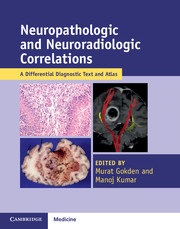Book contents
- Neuropathologic and Neuroradiologic Correlations
- Neuropathologic and Neuroradiologic Correlations
- Copyright page
- Dedication
- Contents
- Contributors
- Preface
- Chapter 1 Introduction to Neuroradiologic Techniques
- Chapter 2 Introduction to Pathologic Techniques
- Chapter 3 Meningeal Mass Lesions
- Chapter 4 Diffuse Leptomeningeal and Dural Lesions
- Chapter 5 Sellar and Suprasellar Region
- Chapter 6 Pineal Region
- Chapter 7 Mass Effect and Edema
- Chapter 8 Cerebral Mass Lesions
- Chapter 9 Cerebral Atrophy
- Chapter 10 Ventricular System
- Chapter 11 White Matter
- Chapter 12 Cerebellum and Brainstem Mass Lesions
- Chapter 13 Malformations
- Chapter 14 Cerebellopontine Angle
- Chapter 15 Spinal Cord
- Chapter 16 Bone and Soft Tissues
- Chapter 17 Peripheral Nervous System
- Chapter 18 Skeletal Muscle
- Chapter 19 Ophthalmic Diseases
- Index
- References
Chapter 14 - Cerebellopontine Angle
Published online by Cambridge University Press: 01 July 2017
- Neuropathologic and Neuroradiologic Correlations
- Neuropathologic and Neuroradiologic Correlations
- Copyright page
- Dedication
- Contents
- Contributors
- Preface
- Chapter 1 Introduction to Neuroradiologic Techniques
- Chapter 2 Introduction to Pathologic Techniques
- Chapter 3 Meningeal Mass Lesions
- Chapter 4 Diffuse Leptomeningeal and Dural Lesions
- Chapter 5 Sellar and Suprasellar Region
- Chapter 6 Pineal Region
- Chapter 7 Mass Effect and Edema
- Chapter 8 Cerebral Mass Lesions
- Chapter 9 Cerebral Atrophy
- Chapter 10 Ventricular System
- Chapter 11 White Matter
- Chapter 12 Cerebellum and Brainstem Mass Lesions
- Chapter 13 Malformations
- Chapter 14 Cerebellopontine Angle
- Chapter 15 Spinal Cord
- Chapter 16 Bone and Soft Tissues
- Chapter 17 Peripheral Nervous System
- Chapter 18 Skeletal Muscle
- Chapter 19 Ophthalmic Diseases
- Index
- References
- Type
- Chapter
- Information
- Neuropathologic and Neuroradiologic CorrelationsA Differential Diagnostic Text and Atlas, pp. 361 - 376Publisher: Cambridge University PressPrint publication year: 2000



